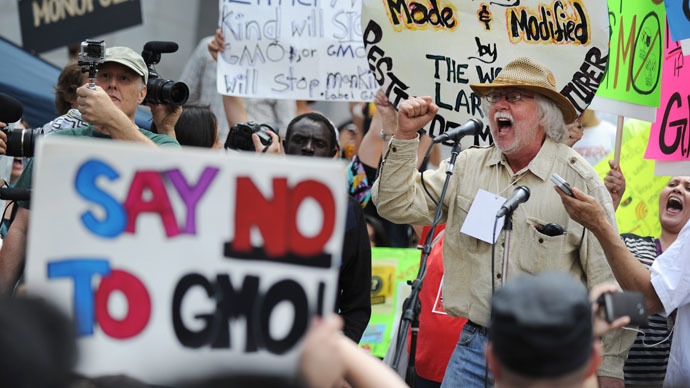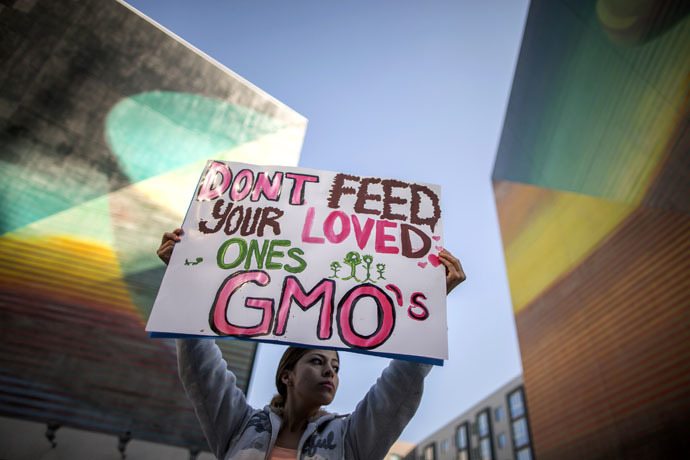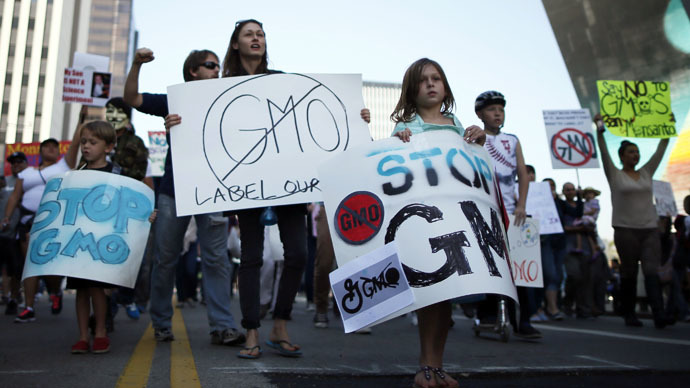Oregon GMO-labeling initiative defeated by Monsanto-sponsored groups

Supporters of an Oregon ballot initiative requiring labels on genetically-modified food acknowledged defeat on Thursday after an automatic recount failed to sway the results of November’s vote and a judge denied their plea for a count of rejected ballots.
The Yes on 92 campaign said there were no legal routes left for them in their efforts to reverse the Nov. 4 vote in which Measure 92 - which would have required manufacturers, retailers, and suppliers to clearly label all genetically-engineered foods or ingredients in raw or packaged items - was defeated by only 812 votes out of 1.5 million.
"The labeling movement will continue to grow," the campaign said in a statement. "We draw strength from the fact that we came so achingly close to winning this vote, despite being outspent by more than $12 million."
The close November vote triggered an automatic recount pursuant to Oregon voting law, but the new tally showed a shift of only 25 votes against the measure. The results of recounts all 36 counties have yet to be certified.
On Tuesday, a judge rejected a request by Yes on 92 for a temporary injunction on the recount certification, as the campaign had filed a lawsuit hoping for a count of 4,600 disputed ballots in which ballot signatures did not match a person’s voter registration. Oregon conducts elections entirely by mail.
Yes on 92 did not promise another campaign in 2016, according to AP.
In what became the most expensive campaign in Oregon’s history, Yes on 92 was outspent $21 million to $9 million by No on 92, which included major agribusiness and biotechnology companies with deep pockets, including Monsanto and DuPont, as well as the venerable anti-labeling trade group Grocery Manufacturers Association.
"After looking at the facts about Measure 92, Oregon voters decided that it rightly deserved a no vote," Pat McCormick, a spokesman for the No on 92 Coalition, said in a statement.
Opponents of GMO labeling involve major retailers and agribusiness firms that depend on domination of the food supply. Their major argument is that GMO foods, especially corn and soy, have been consumed by Americans for around two decades and have not been shown to have an impact on human health in that time period.
While some supporters of GMO labeling concede that human health may not be affected by the direct consumption of GMOs, there are other worries that have pushed the pro-labeling contingent, some of whom are completely anti-GMO, to call for more transparency from the food industry.

Companies like Monsanto market their own patented seeds that, given their genetic modification, can be doused with biocides to kill pests and weeds, and which can jeopardize long-term health of the soil and the necessary biodiversity of a local environment that allows for natural pollination and, thus, food security.
The narrow failure last month of Measure 92 in Oregon marked one of two GMO-labeling voter initiatives that fell short on Election Day.
In Colorado, 66 percent of voters were against a measure that would have mandated labeling of food that contains genetically-modified crops, as 34 percent voted in favor. Prior to the election, a Denver Post poll found 59 percent of voters were opposed to GMO labeling in the state. Proposition 105 would have required food companies to label packaged foods with text reading, “produced with genetic engineering.”
One labeling effort succeeded last month, in Hawaii’s Maui County, though Monsanto and Dow Chemical quickly sued the county despite voters’ wishes.
In recent years, similar labeling measures have failed in other states as well. Voters in California and Washington State narrowly rejected ballot initiatives in 2012 and 2013, respectively, though not without dragging the likes of Monsanto, Bayer, and Dow Chemical into expensive campaigns to defeat the measures.
Amid a wave of concern over GMO foods sweeping through the US and around the world, agricultural giants lobbying against labeling measures have spent over $100 million fighting the measures nationwide.
In response to popular concern over the ramifications of genetically-modified organisms (GMOs) powerful farming and biotechnology interest groups like Monsanto joined forces, as RT has previously reported, under the name 'Coalition for Safe Affordable Food' to push a federal voluntary labeling standard for food made with GMOs in an effort to stem the tide of state legislation seeking to mandate labeling.
On Wednesday, US Rep. Mike Pompeo, sponsor of the federal legislation known as the the Safe and Accurate Food Labeling Act of 2014, discussed his bill before a House subcommittee that included debate over the US Food and Drug Administration’s role in the regulation of genetically-modified food and ingredients.
The hearing included “very little dissention among the members of the subcommittee that tackling GMO labeling federally rather than state-by-state is a good idea,” according to coverage by AgriPulse Communications, which reported that most members of the Energy and Commerce health subcommittee were more concerned that a label would confuse consumers into thinking that genetically-engineered foods were harmful.

“Mandatory labeling could lead consumers to believe that if the government is requiring a GE label, it must mean that GE foods are riskier or somehow fundamentally different from non-GE foods, and to date, scientists have concluded that they are not,” said the committee’s top Democrat, Henry Waxman of California.
“Not one lawmaker on the subcommittee stated clear opposition to the inclusion of GE crops in food supply,” AgriPulse reported, adding that all of the witnesses that testified during the hearing, and who were all invited by the pro-GMO committee members, said they thought GMOs were safe.
Pompeo, an ally of Charles and David Koch, heads of the formidable multinational corporation Koch Industries, said he hoped his bill would see legislative action at the committee level in March or April.
“I think folks who stare at this and get a chance to really see where the science is, what this means to the average consumer if we don't get it done, often come to the conclusion that what we're trying to do makes sense,” Pompeo told reporters.
“I didn't see anything (in the hearing) today that causes me to believe that we can't go figure out a way to get 275 or 300 plus votes in the House and the same kinds of majorities in the Senate. I think folks from all across America are going to demand that Congress act to prevent an enormous spike in food costs if we don't get this done.”
According to a study that analyzed research on labeling costs ahead of Oregon’s ballot initiative, mandatory labeling of genetically-engineered foods available to consumers would result in a cost increase of only $2.30 per person each year.












